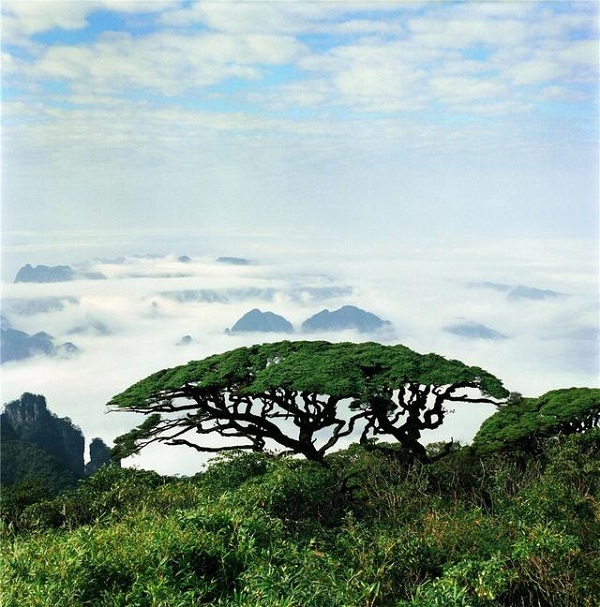Patrolman shrugs off isolation as duty calls

Dayao Mountains [Photo/chinadaily.com.cn]
A major difficulty forest ranger Huang Tongfu has often had to endure at the Dayao Mountains National Nature Reserve is the loneliness that results from being cut off from the world.
In 2003, the then-49-year-old was hired by the reserve in Jinxiu county, Guangxi Zhuang autonomous region, while he did temporary work as a tree planter. In 2006, he was assigned to the Longdao Mountain patrol spot, a branch of the reserve's Changtan River patrol station.
Located at the edge of the reserve, which lies at about 1,200 meters above sea level, the mountain patrol spot was once one of the remotest sites in the facility. No sealed road connected it to the outside world, and there was no access to electricity or tap water.
Huang had to live in a bamboo hut and walk for seven or eight hours to buy daily necessities at the nearest market. He had to wait two years until the reserve built a 7-kilometer-long gravel lane to connect the site with a county road, and he waited another year for access to power and tap water.
In the winter of 2008, a freezing chill swept South China. Huang was isolated for 10 days on his own at the patrol spot. A team of rescuers had been held up by the adverse weather and was 30 km away.
On the ninth day, the power was cut and the tap water froze. Huang decided to "rescue" himself. He spent nine hours walking 12 km in freezing conditions before he reached a village. The members of the rescue team found him there on the 13th day.
In the old days on the mountain, Huang was responsible for patrolling about 1,670 hectares of forest. On average, he needed to walk 10 km a day. Often, he and a colleague carried tents and food and spent two days and a night on each patrol route.
Familiar with the whole area, in June 2008, Huang guided rescuers to locate and save a group of trekkers from Nanning, Guangxi's capital, who had become lost in the wild.
Most of the time, Huang's work was just flat and lonely. His wife divorced him in 2014 after failing to persuade him to leave the isolated spot and find work in a city.
His life has become a little livelier since he met and married his current wife, Huang Rixiu, in 2016, because she enjoys accompanying him on his patrols. In 2017, she was hired as the reserve's only female ranger, working with her husband at Longdao Mountain.
Living in a building with several rooms, they raised pigs, chickens and dogs in a compound and decided to make the patrol spot their real home.
"My daughter with my ex-wife is already married," Huang Tongfu said. "My wife's son with her ex-husband studies in Liuzhou (a city in Guangxi). He stays with us here, even during vacations."
The husband earns 2,400 yuan ($375) a month, while the wife makes 2,000 yuan. They have six dogs, two geese and a flock of chickens. Huang Rixiu also tends a vegetable plot.
They often patrol along three paved patrol routes: one 12 km long; one 8 km; and another 7.5 km. Except for days with heavy rain or snow, they patrol the area almost every day, with three or four of their dogs.
Once every week or so, the couple ride a motorcycle to visit a nearby market and buy necessities.
They have spent every Spring Festival on the mountain since they married. Huang Rixiu's brother and sisters visit them during holidays. In winter, the gravel road freezes, making it too slippery to ride their motorcycle, so their home becomes even more isolated. "Sometimes in winter, we don't have any visitors for one or two months," Huang Rixiu said.
Last year, the couple's devotion to their work saw them honored as one of Guangxi's "model families".
Their dearest wish is for a cellphone network that will cover their home, so they can buy necessities online.
Now, if they want to buy anything online, they have to ask visiting relatives to place the order and then collect the purchases a few months later. "I don't know how to use Taobao," Huang Tongfu said. "I hope I can learn to use it in the future."
